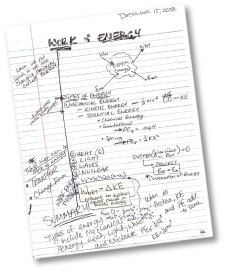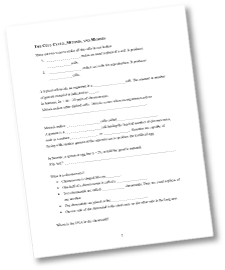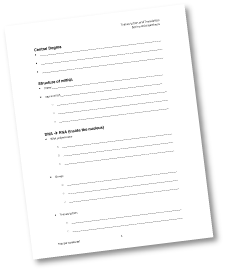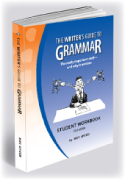|
newsletter — AUGUST 16, 2015
Three skills your student needs
Part 1 of 3: Skills students must sharpen before college
by Diane Speed
The college admissions officer sitting across from us asked my son, "Since you've been homeschooled your entire life, will you know how to conduct yourself in a classroom setting?"
I struggled to hide my shock at what seemed to me this gentleman's cluelessness about homeschooling. My son, meanwhile, answered him without skipping a beat: "Oh, I've been in classroom settings throughout my homeschool education."
Following that encounter, I realized that the admissions officer's blunt question derived from a set of concerns about homeschoolers still prevalent in higher education. In the ensuing years, however, I've come to admit that such concerns are at times legitimate—some homeschooled students never venture far from their kitchen tables, and there are indeed some skills best learned in a classroom setting.
Homeschooling parents must ensure that their highschoolers get real-world classroom experiences in three areas:
- taking lecture notes;
- managing multiple deliverables;
- advocating for themselves.
In this, the first of three parts, we'll examine the challenge of teaching homeschooled students note-taking skills—specifically, taking lecture notes.
 Part 1: Taking lecture notes Part 1: Taking lecture notes
Taking notes in a lecture is a learnable skill, but for many students, it may require hours of trial and error. The only way to acquire the skill, moreover, is to attend a live lecture. That is, when students take notes on recorded lectures, they can stop the recording at any time to capture essential information. —Not so in live lectures.
In a live lecture, capturing key ideas and details requires an intense degree of concentration. It requires multi-tasking—the student must simultaneously:
- listen attentively—often to completely new facts or ideas;
- write them down in a concise and legible manner;
- hear and retain the concept currently being presented while still writing the previous one.
What compounds the challenge is that as they embark on mastering this complex skill, teenaged students may be contending with a variety of learning issues—audio-processing delays, dysgraphia or dyslexia, concentration deficiencies, fatigue from the ravages of puberty—all while hearing the highest-level concepts they've ever encountered.
A technique for training students
I teach Honors Biology in a program we call The Blend, and I've found a way to help my students strengthen their note-taking skills. The method I use is worth a closer look, because it sheds light on the challenges that lie ahead for all our students.
Biology may well be the most vocabulary-intense of all the sciences, so my course is filled with terms that arise from Latin or Greek roots. To students encountering them for the first time, such terms seem quite foreign and difficult to assimilate. Many terms, for instance, have complex spellings and antique meanings—e.g., osteichthyes, the class of fish so named for having a bony skeleton. This term is difficult to spell and even harder to remember, unless one learns that:
 oste– comes from the Greek osteon ("bone"); oste– comes from the Greek osteon ("bone");- –ichthyes from the Greek ikhthus ("fish").
As a way to help students absorb the course content while learning to take notes, I create note-taking sheets—essentially, forms that help students build the skills needed to simultaneously:
- listen and understand abstract concepts;
- absorb complex vocabulary;
- capture the information in written form.
My lectures precisely follow the sequence of the concepts to be recorded on these sheets, and at the beginning of the year, they are essentially fill-in-the-blank forms (right, above). But as the year progresses, the forms get sparser, more resembling nearly blank linear outlines (right, below). This method seems to be an effective bridge.
 All students in my class—even those with special needs—take a high level of ownership for capturing lecture information. I keep the use of these note-taking forms entirely optional: some students like creating their own notes and feel that the forms constrain their creativity and mental processing; others find the forms indispensable. After class I often meet with students who even with the note-taking aid missed key concepts or bits of information; they meet with me to capture what they missed. All students in my class—even those with special needs—take a high level of ownership for capturing lecture information. I keep the use of these note-taking forms entirely optional: some students like creating their own notes and feel that the forms constrain their creativity and mental processing; others find the forms indispensable. After class I often meet with students who even with the note-taking aid missed key concepts or bits of information; they meet with me to capture what they missed.
Writing notes by hand versus typing
In The Blend, Roy and I require that our students take notes by hand. This practice may seem old-fashioned, but there have been numerous studies showing that writing by hand helps students process information in a way that typing does not. Consider the 2014 study by two Princeton researchers. The authors write:
The present research suggests that even when laptops are used solely to take notes, they may still be impairing learning because their use results in shallower processing. In three studies, we found that students who took notes on laptops performed worse on conceptual questions than students who took notes longhand. We show that whereas taking more notes can be beneficial, laptop note takers' tendency to transcribe lectures verbatim rather than processing information and reframing it in their own words is detrimental to learning.
The essential point is that in a lecture, the student needs to simultaneously 1) process the information and 2) capture it for study purposes (with the aim of achieving recall). Studies suggest that when a student types, he or she tends to capture verbatim the lecturer's words but in a manner that is often automatic—akin to driving without later being able to recall what the road looked like. The same studies suggest that with handwriting, by contrast, the student—for whatever reason—engages more actively with the content. The explanation may lie in the slower speed of handwriting: the student must continually select what to capture, requiring intense engagement with the material and culminating in better comprehension and recall.
Orienting students to this new phase
I often have to remind my students that capturing the information on paper in excellent notes is not the end result; the information must be captured and digested in the mind. True long-term retention only happens when notes and annotations are reviewed and committed to memory.
For many students, high-school work is the first time in their academic careers that they have had to study actively. The depth and scope of the information is so rich that simply allowing the content to wash over the mind is not enough.
What's more, it is later, in their active review of their own notes, that students forge connections among concepts. Higher-level learning is all about such connections. Experts in study skills often recommend that students re-write or highlight and annotate their own notes as another method of actively digesting the information. — Yet for many homeschoolers, the whole proposition of returning to and reviewing your notes may be a novel activity. Schooled students, by contrast, have long familiarity with this kind of study, because they have typically been fed a steady diet of quizzes and tests, which require it.
Many college websites have study skills pages. Consider this one from Pace University — here's an excerpt:
- Rewriting is not the same thing as re-copying. Rewriting your notes entails customizing them, so to speak, so that they take a shape that makes sense to you and that you find useful for studying, learning, understanding, and remembering. For example:
- Reorganize your notes in a way that fits with the way you think and remember, since how you organize may be different than the way your professor presented the information in class.
- Make lists or devise new categories for sorting information.
- Identify and emphasize connections between information.
- Cross-reference your class notes with notes you take from your textbook.
Many college-level classes require that students pre-read the text prior to each lecture; this is the model I employ in Honors Biology. By pre-reading lecture topics, students benefit in two ways:
- they become acquainted with terms and concepts prior to hearing them in lecture;
- they annotate their text—a helpful step in mastering the information.
For more on annotations, see our previous blogs:
Conclusion
As homeschooling parents, we have to ensure that our students have opportunities to take notes in live lectures, and then work with the notes as study aids. Some students need help mastering the multi-tasking required for taking notes; selecting content, in particular—sorting the essential from the non-essential—is not always obvious to the neophyte. Equally important, reviewing and reworking notes is a study skill often assumed to be obvious but, in the case of homeschooled students who aren't force-fed dozens of quizzes and tests each year, is easily overlooked. Homeschooling parents need to actively ensure their students learn these habits.
In future blogs, we'll discuss the other two skills your student needs:
- managing multiple deliverables;
- advocating for oneself.
Not on our mailing list? — Adding yourself is easy; just go here.
|
|
|
View all our online courses here.
Eight weeks, in depth, live & online
Twice weekly sessions for two semesters
Twice weekly sessions for two semesters
- March 7, 2020: Beyond the Tour: Getting the most from your college visits
- July 29, 2019: Advocating for oneself, Part 2: College admissions essays & interviews
- May 29, 2019: What our students aren't taught about grammar
- May 16, 2017: Advocating for oneself (Part 1 of 2)
- July 20, 2016: The development of adolescent minds
- December 24, 2015: The appeal of videogames—and the hazards they bring
- August 16, 2015: Three skills your student needs to develop before college (Part 1 of 3)
- July 3, 2015: How literature is now taught in college—and why enrollment in literature courses is in steep decline
- June 1, 2015: Teaching Shakespeare to your kids: What I've learned
- Dec 28, 2014: Extracurricular activities, Part 2
- July 27, 2014: Levels of annotation —
Annotating the text, Part 2
- July 15, 2014: Extracurricular activities, Part 1
- July 2, 2014: Teens need to be together… An innovative solution
- June 9, 2014: The college admissions racket — Getting things into perspective
- June 2, 2014: Building good study habits
— Annotating the text, Part 1
- April 8, 2014: Building good study habits
— Close reading
- March 18, 2014: Why all our students must study Shakespeare
- Feb 25, 2014: Standardized tests, Part 2
- Feb 18, 2014: Standardized tests, Part 1
- Feb 1, 2014: Advanced mathematics
|
|
Shakespeare Intensives
Close reading of Shakespeare
Ten online sessions of 90 minutes
Ten online sessions of 90 minutes
Seven online sessions of 90 minutes
An introduction to Shakespeare's comedy
Eight online sessions of 90 minutes
ONLINE: English Language Arts
— Now open for registration —
Weekly online class
in the essentials of English
 This two-semester course is taught by the author of The Writer's Guide to Grammar. It puts in place skills and knowledge foundational to the study of English and the mastery of clear writing. The weekly class is live and online, and students master all the most important principles of the English language — grammar, usage, punctuation, and more. This two-semester course is taught by the author of The Writer's Guide to Grammar. It puts in place skills and knowledge foundational to the study of English and the mastery of clear writing. The weekly class is live and online, and students master all the most important principles of the English language — grammar, usage, punctuation, and more.
Online Writing
Two semesters of online classes
Two classes per week
Online Literature
Two semesters of online instruction
Training for parents
Now an online series!
This program addresses the principal concerns parents have about homeschooling through high school — curriculum and credits, standardized tests, transcripts and record-keeping, the application process, pursuing scholarships, and more.
Terrific. Full of information. The materials were so thorough. I now have a plan of action. Also, this workshop is inclusive: No matter what type of homeschooler you are, you will understand better how to prepare your student for college and present him or her in the best light.
Mother of two
|
|
![]()